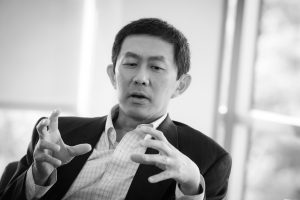
By Melanie Balog
In a short time, George Mason University’s School of Business has become a leader in the National Capital Region and an important resource for the business community. The school consistently is ranked among the Top 100 best undergraduate programs and part-time MBA programs by U.S. News & World Report, no small feat for a school that is just 39 years old.
With the search for a new dean underway, George Mason has a chance to take the school to a new level and establish it as the premier business program in the region. Provost S. David Wu says a critical part of that strategy is to build on the existing business partnerships established by outgoing dean Sarah Nutter.
The goal is to have a new dean at the helm for fall 2017.
A transformative leader
Most of all, Wu is searching for someone who can take the school to the next level of national prominence.
“We need a leader who is able to put together a long-term vision for the school that would bring excitement to various stakeholder groups and who is also able to raise resources to move the school forward,” Wu says.
That means knowing when to lead, and when to delegate. The dean has to take the lead in fundraising and in engaging the business community and key stakeholders, Wu says. But he or she will also build a successful team.
“A good leader is one who is able to recruit and leverage strong talent to make these things happen, and not necessarily do it themselves,” he says.
How Mason has positioned the business school
Wu credited Nutter with putting the school on solid footing.
“The school is well-run, well-organized, and offers a very robust set of academic programs,” he says.
The next dean will also inherit a strong network of supporters, thanks to Nutter’s collaborations with the business community.
“Without that it wouldn’t really be possible to envision that ambitious next step.”
And that next step is a big one.
“The business school potentially has the opportunity to engage the much broader business community, not only here in Northern Virginia but also the whole Capital Region and also nationally,” Wu says.
Being positioned in the middle of a vibrant economy helps, with key industry presence from hospitality, entrepreneurship, innovation, and of course government.
Mason’s GovCon initiative, for example, is something Wu cited as a visible area of strength for the school that will continue to grow under the new dean’s leadership.
Opportunities
While acknowledging that there are some core functions that need to be conducted at the Fairfax Campus, Wu has a larger vision for the school to grow both physically and virtually.
“The School of Business needs to be in multiple locations, not only here in Fairfax but in Arlington and maybe eventually in Loudoun when we have our campus there better established,” he says, citing Metro access as being critical for growing graduate and professional education.
The recent agreement with online education provider Wiley will give the School of Business a clear path forward.
“The business school is likely to be one of the active players in that partnership,” he says. “They must build a significant presence in the online space because that’s where a lot of the competition takes place.”
The physical realities of some current campus facilities are very clear though.
“The school frankly has outgrown the space we have in Enterprise Hall,” he says.
That presents a tremendous opportunity in the form of a naming gift, which Wu says could be transformative for the school.
“The school is really at that brink, that it could go to the next level with those kinds of major investments.”
Becoming the center of activity
“I think we should have a prominent business school here in the National Capital Region, and frankly, we should be the dominant player here in Northern Virginia. So I think the School of Business really has the potential to fit into that role and become a source of innovation and talent development,” Wu says.
“In many ways, we are that engine for economic development in the region. The people we produce are very much part of that. And of course they also play the role of stimulating entrepreneurial activities and going above and beyond their academic contribution—actively engaging in creating new businesses, taking new ideas to the market, actively engaging in those new economic activities as well.
“That is what a strong business school does—becomes that center of activity.”
